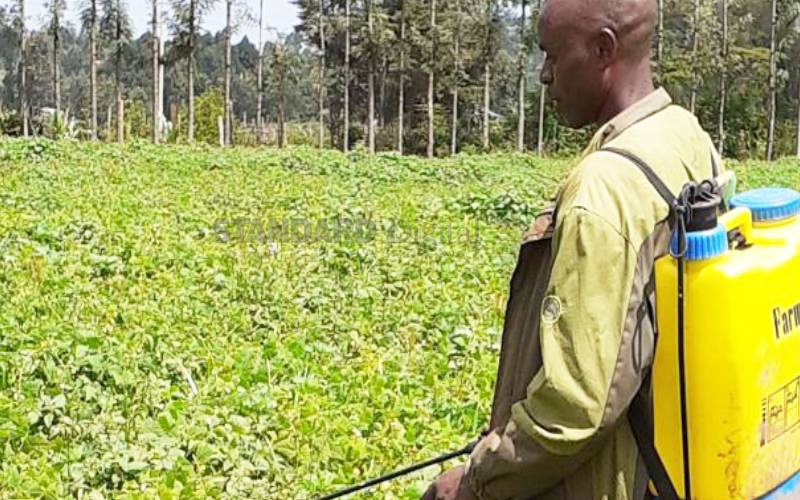Kenya’s horticulture farmers have for long lived in fear of their products being rejected by the European market.
They exercise caution in every step of production and for a good reason as Kenyan produce has in many instances been blocked from accessing the European market.
In some cases, the European Union (EU) has warned Kenya that its food and fresh produce may not enter Europe due to high residual levels.
Fresh produce from Kenya has always been on the EU’s quality watch list.
The flipside to this story is that most of the chemicals that have made Kenyan flowers, vegetables and fruits poisonous to the extent of being turned back at the borders of any European country are manufactured in Europe.
A new report notes that more than 100 pest control products that are sold in Kenya contain harmful chemicals and have been banned in Europe.
A majority of the products manufactured using harmful chemicals or active ingredients are produced by European firms but not allowed to retail in Europe.
They are instead meant for export.
“In total, 155 companies have registered 699 products in Kenya. Most of the products originate from Europe. This means Europe and not China, as often argued, is the market leader in terms of pesticide sale,” said the report.
The Route to Food Initiative (RTFI) – a non-governmental organisation commissioned the report – titled Pesticides in Kenya: Why Our Health, Environment and Food Security at Stake is pushing for the withdrawal of the highly toxic pesticides from the market.
“At least 32 per cent of the active ingredients in the Kenyan market poses a serious potential impact on human and environmental health and are withdrawn from the European market,” noted the report in part.
“The products registered in Kenya, that are withdrawn from the European market, are mostly sold by European companies (75 products), followed by Chinese companies (55 products) and Indian companies (16 products). This is important and warrants a serious discussion about existing European, Kenyan and international legislation, standards, guidelines, and their gaps.”
The Route to Food report noted that despite European firms flooding Kenya and other countries with toxic products, they are prohibited from selling the same products in their home countries.
The move is sanctioned by EU laws, which ban the use of certain active ingredients in pesticides sold in the EU but okays the use of same banned ingredients in making products that are exported to other markets.
Although there are 36 different European companies, almost half of the products (48 per cent) are registered by BASF, Bayer AG, and Syngenta.
“The EU Regulation EC304/2003 allows their companies to produce and export banned or restricted pesticides for domestic use to other countries – the so-called double standard,” said the RTFI report.
“However, in a recent report to the Human Rights Council (Elver, 2017), the UN Special Rapporteurs on Toxic Wastes and the Right to Food stated that to expose other nations to toxins known to cause major health damage or fatality is a clear human rights violation.”
They called on countries to remove these existing double standards, especially with countries with the weaker regulatory systems.
Among the major issues that have resulted in little or no policing of the pesticides coming into Kenya include weak legislation, with the law governing use and importation of pesticides having been created in 1982.
Apart from the archaic nature that does not equip it to regulate new trends, the Pest Control Products Act has limitations as it does not enable Pest Control Products Board to recall products from shelves once it has approved them.
Other than production of pesticides that the EU doesn’t allow to be used at home, Layla Liebetrau, the project lead of the Route to Food Initiative (RTFI), noted that the prohibition from entry into EU of horticultural produce grown using the same chemicals presents another level of double standards.
“This is a major double standard, yet Kenya is trying to tap into this market for horticultural products that are grown but they are blocked because they do not meet certain standards, which can be attributed to the use of these chemicals,” said Ms Liebetrau
“It is disconcerting to note that the sale of these chemicals, many of which are not approved in Europe, is going on unabated with little regard to public health and environmental safety. Our findings show that there are 24 products in the Kenyan market, which are certainly classified as carcinogenic, meaning they have the potential to cause cancer while the same number (24) are mutagenic, meaning these substances have the capacity to cause damaging genetic changes. Others have been proven to negatively affect hormones and show clear effects on reproduction.”
The volume of imported chemicals more than doubling within four years from 6,400 tonnes in 2015 to 15,600 tonnes in 2018, which has eased access by farmers as well as consumers guaranteeing continued and even increased exposure to highly toxic pesticides.
“Withdrawing these products from the market will reduce their availability to farmers and would be an urgent and significant step in trying to reduce the adverse effects pesticides pose to our health and food safety,” said Kenya Organic Agriculture Network Chief Executive Eustace Kiarii.
“The assumptions, such as ‘safe use’ and labelling that inform whether a pesticide is registered in Europe is different in Kenya which may lead to higher exposure risk for farmers, consumers, and the environment.” Through the Pest Control Products Board, there are 247 active ingredients registered in 699 products for horticultural use.
The RTFI report explains that there are more products than active ingredients since one active ingredient can be in different formulations registered by different firms in different products.
The active ingredient glyphosate, for example, is registered in 39 products by 22 companies.
Mr Kiarii said while State entities such as the Kenyan Plant Health Inspectorate Service take food samples for testing, the actual levels of pesticides are not made public.
This threatens the public’s understanding of the safety of food consumed. Additionally, epidemiological health studies related to pesticide exposure in Kenya, do not exist.
This means the extent of impacts of pesticides on the environment and health of the citizens, is not definitively known.
Esther Bett, a programme manager at Resources Oriented Development Initiatives, and small-scale farmer in Uasin Gishu noted that historically, excessive use and misuse of pesticides have been linked to contamination of surrounding soil and water sources.
This, she observed, causes loss of biodiversity, destroying beneficial insect populations that act as natural enemies of pests and reducing the nutritional value of food.
“While regulators are mostly concerned about health risks through pesticide residues, their effect on non-target organisms are hugely underestimated, especially in African registration procedures. Pesticides can persist in the environment for decades and pose a global threat to the entire ecological system upon which food production depends,” she observed.
The lobby wants the national and county governments to implement regular monitoring of food produce, processed foods, and the natural environment. This, she said will be in addition to addressing transparency and data gaps to curb the rise in pesticide use in Kenya.





